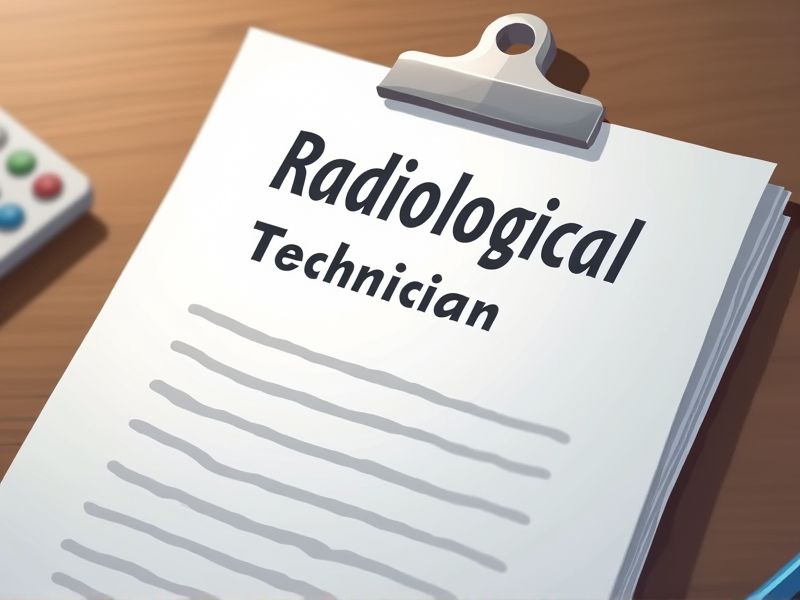
Radiological Technicians play a crucial role in the healthcare system, responsible for accurately capturing diagnostic images. To ensure they meet stringent standards of patient safety and image quality, certain certifications become essential in their career. These certifications validate their knowledge in radiation safety, equipment handling, and patient care protocols. Here are some important certifications you may need as a Radiological Technician.
ARRT Radiography Certification
The ARRT Radiography Certification establishes a standardized level of competence, ensuring radiological technicians possess the necessary skills and knowledge. Certification enhances patient safety, guaranteeing that technicians adhere to best practices in imaging procedures. Hospitals and clinics often require this certification to meet regulatory and accreditation standards. Earning the certification can lead to better job prospects and higher earning potential for technicians in the radiology field.
State Radiologic Technologist License
A State Radiologic Technologist License ensures that radiological technicians meet standardized qualifications and competency levels. It protects public health by regulating the professionals who handle radiological equipment and manage radiation exposure. Licensing helps maintain quality and safety in medical imaging, reducing errors in diagnosis and treatment. States can track and enforce continuing education requirements for technicians, promoting ongoing professional development.
CPR Certification
Radiological technicians often work in healthcare environments where they may encounter patients experiencing cardiac arrest. CPR certification equips them with the skills to perform potentially life-saving interventions in these critical situations. This certification enhances the technician's capability to respond promptly, thereby improving patient safety. Hospitals and clinics generally require CPR certification to ensure that all staff can contribute to emergency response efforts.
Basic Life Support (BLS) Certification
Obtaining Basic Life Support (BLS) Certification equips radiological technicians with essential skills for responding to medical emergencies, which is crucial when working closely with patients who may have underlying health conditions. The knowledge and techniques gained from BLS training enhance patient safety and improve outcomes, as radiological procedures can sometimes trigger adverse reactions. Many healthcare facilities require BLS Certification for staff to ensure a standardized level of emergency preparedness across departments. Holding this certification also demonstrates a technician's commitment to professional development and comprehensive patient care.
Computed Tomography (CT) Certification
CT Certification enhances the skills of a radiological technician, ensuring they can effectively operate sophisticated imaging equipment. The certification process verifies their ability to produce high-quality images, critical for accurate diagnosis and patient care. It demonstrates compliance with safety protocols, reducing radiation exposure risks to both patients and technicians. Job market competitiveness and potential for higher wages increase as employers often seek certified technicians for specialized roles.
Magnetic Resonance Imaging (MRI) Certification
Obtaining MRI certification is necessary for radiological technicians to ensure they have the specialized knowledge required to operate complex MRI machines safely. This certification helps minimize the risk of misdiagnosis due to improper imaging techniques. The demand for MRI-certified professionals has increased as MRI technology becomes more central to diagnostic processes. Certification often leads to higher earning potential and career advancement opportunities for technicians.
Nuclear Medicine Technology Certification
Nuclear Medicine Technology Certification ensures radiological technicians possess the specialized knowledge required to handle and administer radiopharmaceuticals safely. It validates the technician's ability to operate complex imaging equipment and interpret diagnostic scans accurately. Certification aligns with industry standards, which enhances clinical practice and patient care. Employers and regulatory bodies often require certification to maintain compliance with safety and professional guidelines.
Radiation Safety Officer (RSO) Certification
Radiation Safety Officer (RSO) Certification is required for Radiological Technicians to ensure that they are equipped with the knowledge to manage and mitigate radiation risks, safeguarding both patients and workers in healthcare settings. Certification validates a technician's competency in complying with stringent regulatory standards, maintaining operational safety. When technicians are certified, it reduces the likelihood of radiation exposure incidents, thereby minimizing potential health hazards. It fosters a culture of safety that is essential for maintaining trust and effectiveness in medical radiology practices.
Mammography Certification
Mammography certification ensures radiological technicians possess specialized skills necessary for accurate breast cancer detection. The certification process improves the quality of patient care by standardizing practices across professionals. Breast cancer screening requires a high level of precision, and certified technicians are more likely to reduce diagnostic errors. Regulatory and accreditation bodies often mandate certification, which influences a facility's legitimacy and trustworthiness.
Advanced Imaging (PET/CT) Certification
Obtaining Advanced Imaging (PET/CT) Certification enhances a radiological technician's expertise, allowing them to handle complex imaging technology accurately. This certification ensures adherence to industry standards, thereby reducing errors and improving diagnostic reliability. Certification can lead to higher career prospects and potentially increased salary due to specialized skills. The advanced training included in certification empowers technicians to better support patient care by providing precise data for diagnoses.
Summary
When you, as a Radiological Technician, obtain additional certifications, your expertise in specialized imaging techniques is enhanced. This advanced skillset often results in increased job opportunities and potential salary growth. Employers may prefer certified technicians, recognizing their commitment to ongoing education and proficiency. Consequently, your career advancement prospects and professional recognition are likely to improve.
